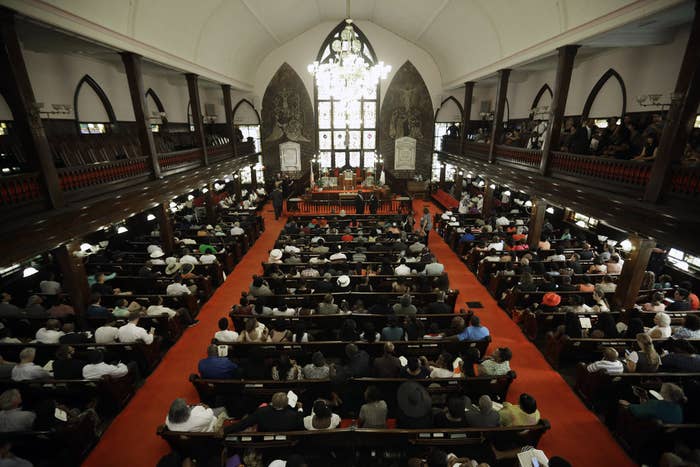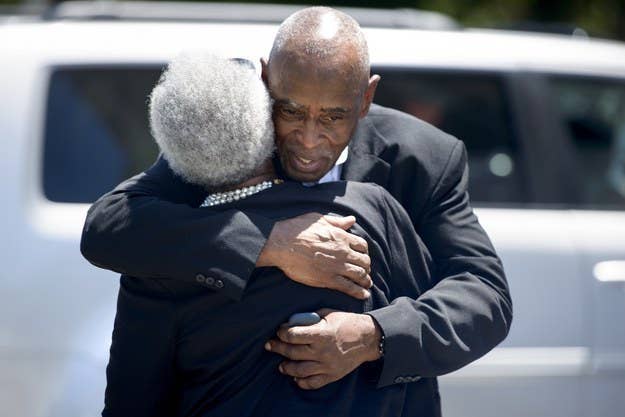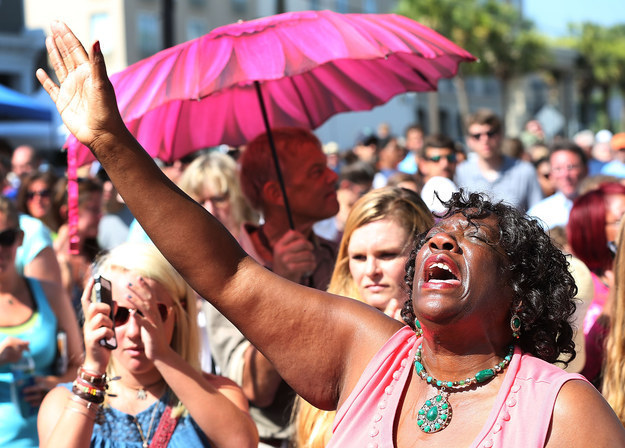
An hour before the first Sunday service at Mother Emanuel church since the massacre there Wednesday, the seats were filling quickly and a young girl asked her mother why so many people were here today. The mother stumbled for words, then paused, then stumbled again, then said, "There were good people who are not here anymore."
She paused. "We're here to celebrate them."
Soon organ music played and soon after that the choir began to sing. The hundreds inside the historic Charleston, South Carolina church stood and cheered, clapped and swayed from side to side, sweated in the heat and fanned their faces, hugged and cried, shouted "Amen!" and "Alleluia!"
On Wednesday, a white man named Dylann Roof, whose apparent online manifesto details a vicious hatred for black Americans, had allegedly shot and killed nine black parishioners during a bible study in the church's basement. Over the following days, as law enforcement arrested and charged Roof and people around the world turned their attention to Charleston, those closest to the tragedy responded with messages of love, forgiveness, and resolve, even as they struggled to cope with the agonizing loss of their loved ones.
Four days later, Mother Emanuel was again filled with the sounds of song and worship.
"The doors of the church are open," the Rev. Norvel Goff Sr., who led the service, told the congregation. "No demon on earth can close the doors of God's church."
Some attendees had grown up in the city, left, and then returned to mourn. Karen Watson-Fleming came back to her hometown from Jacksonville, North Carolina on Thursday, just after the shooting. Like many others, she had returned to support the church as it grappled with a grievous loss. She had not been back to Mother Emanuel in years, and yet she said of the church, "This is home."
Some, including many of the white families in attendance, had never stepped foot in the church before Sunday. Others, like Crystal Kornickey, had deep, generations-long ties to this church. Just three weeks before he was killed, she said, Pastor Clementa Pinckney gave the eulogy at her aunt's funeral. "It was wonderful," she said. She had worshipped at Mother Emanuel on scores of Sundays. But none of those Sundays was like this one.

On this Sunday, a thick row of flowers lined the sidewalk in front of the church. News cameras streamed footage from the church's balcony and from across the street. Hundreds who could not fit inside the church stood outside, singing along to the songs that poured out the front doors. Sheriff's deputies checked bags at the door. Police officers posted up along the walls. Politicians, including Gov. Nikki Haley, Sen. Tim Scott, and former Sen. Rick Santorum, sat on the pews among the regular parishioners. On this Sunday, a community, a city, a country had turned to this church to help ease the pain from an unspeakable tragedy.
"The devil was trying to take charge," Rev. Goff told the congregation. "But the devil cannot take control of Your people and the devil cannot take control of Your church."
His message, and the message of the several other preachers who took the lectern, was one of faith in the shadow of horror and strength in the shadow of evil.
"May love take charge," he added.
For long stretches, the sorrow that had engulfed this place seemed to fade, replaced by the familiar. Familiar hymns and familiar scripture, women in Sunday white and men in Sunday suits, children restlessly rocking in their seats, the same old rhythms of so many services in so many churches for so many years.
Kornickey felt the same spirit that had kept drawing her back to Mother Emanuel, the same church where her parents and grandparents and great-grandparents had found refuge through years of tragedies. And yet Mother Emanuel was still here.
"I get that charge," she said. "There is a deep history here. There is a special vibe here. It is a feeling you get here, and I can't even put it into words."

But the sorrow never truly faded. All throughout the two-hour service, behind the joyous dancing and the talk of "bright days," there remained the memory of the evil that had taken place in a room just below where the hundreds stood.
"We are reminded this morning about the freshness of death," the preacher said. "We ask questions, Lord. We ask why. It is our human nature."
As the service wound to a close, Rev. Goff read the names of the victims. People walked up the aisle to kneel and pray at the base of the altar. Boxes of tissues passed through the crowd. For a moment, the music and the singing and the preaching stopped, and the loudest sound was the sound of sobbing.
Then, later, the doors opened and the people began to make their way toward them. Then the preacher told them to stop.
With every eye looking upon him, he said, "Turn to somebody and say, it's gonna be all right."
the memorial, as of Sunday morning:

